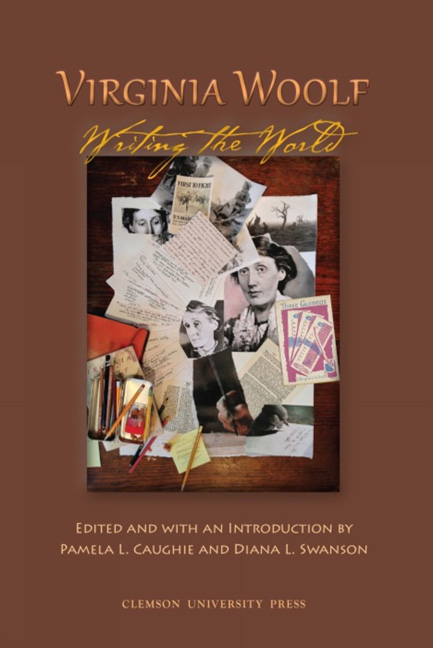Book contents
- Frontmatter
- Table of Contents
- Introduction
- Acknowledgmen
- Abbreviation
- WAR AND PEACE
- WORLD WRITER(S)
- ANIMAL AND NATURAL WORLD
- WRITING AND WORLDMAKING
- Negative Feminism and Anti-Development in Virginia Woolf's The Voyage Out
- Upheavals of Intimacy in To the Lighthouse
- The Reconciliations of Poetry in Virginia Woolf's Between the Acts; or, Why It's “perfectly ridiculous to call it a novel”
- Virginia Woolf, Composition Theorist: How Imagined Audiences Can Wreck a Writer
- The Precarity of “Civilization” in Woolf's Creative Worldmaking
- Notes on Contributors
- Conference Program
- Appendix: Virginia Woolf Conference Exhibit Items, Newberry Library
Virginia Woolf, Composition Theorist: How Imagined Audiences Can Wreck a Writer
from WRITING AND WORLDMAKING
- Frontmatter
- Table of Contents
- Introduction
- Acknowledgmen
- Abbreviation
- WAR AND PEACE
- WORLD WRITER(S)
- ANIMAL AND NATURAL WORLD
- WRITING AND WORLDMAKING
- Negative Feminism and Anti-Development in Virginia Woolf's The Voyage Out
- Upheavals of Intimacy in To the Lighthouse
- The Reconciliations of Poetry in Virginia Woolf's Between the Acts; or, Why It's “perfectly ridiculous to call it a novel”
- Virginia Woolf, Composition Theorist: How Imagined Audiences Can Wreck a Writer
- The Precarity of “Civilization” in Woolf's Creative Worldmaking
- Notes on Contributors
- Conference Program
- Appendix: Virginia Woolf Conference Exhibit Items, Newberry Library
Summary
In 1987, Peter Elbow published an article that generated a buzz among composition scholars due to his argument that writers should, at least in the beginning stages of drafting, ignore their audience. “An audience is a field of force,” he explained. “The closer we come—the more we think about these readers—the stronger the pull they exert on the contents of our minds” (94). In Elbow's conception, although some audiences are “enabling” and some “inhibiting,” most audiences are simply distracting. The eff ects of these audiences could be devastating to the writing process, as Elbow wrote: “Sometimes we get so tied in knots that we cannot even figure out what we think ” (97).
Elbow's claims, by his own admission, are ambitious; they go against a common mantra repeated by teachers of writing: Keep your audience in mind. Some scholars responded to Elbow with shock and concern, but a fan of Virginia Woolf might read Elbow's work and express no surprise at all. The trials of writing are a familiar subject in Woolf's works, and she was an author who spent an unusual amount of time describing her drafting and revision processes to others. One of her most discussed topics was the relationship between writer and audience. Over fifty years before Elbow's work made waves among compositionists, Woolf published “Professions for Women” (1942), which included a passage describing how her own imaginary audience member, “The Angel in the House,” haunted her early writing.
Had I not killed her she would have killed me. […] For, as I found, directly I put pen to paper, you cannot review even a novel without having a mind of your own, without expressing what you think to be the truth about human relations, morality, sex. And all these questions, according to the Angel in the House, cannot be dealt with freely and openly by women; they must charm, they must conciliate, they must—to put it bluntly—tell lies if they are to succeed. Thus, whenever I felt the shadow of her wing or the radiance of her halo upon my page, I took up the inkpot and flung it at her. (59–60)
- Type
- Chapter
- Information
- Virginia Woolf: Writing the World , pp. 197 - 203Publisher: Liverpool University PressPrint publication year: 2015



